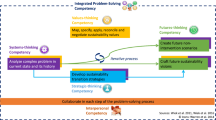Abstract
In this paper I discuss three issues relevant to the ideas introduced by Colucci-Gray, Perazzone, Dodman and Camino (2012) in their three-part paper on epistemological reflections and educational practice for science education for sustainability: (1) social studies of science for science education, (2) education for sustainability or sustainable development, and (3) curriculum studies and action-research. For the first issue, I address the need for science education efforts dedicated to an epistemological renewal to take seriously into consideration the contributions of the social studies of science. This perspective may be fruitful for an education for sustainability that also requires one to consider the political dimension of environmental issues and their intrinsic power relationships. It also encourages the abandonment of dichotomies that hamper democratic participation: experts/lay people, science/society, scientific knowledge/values, etc. For the second issue, my commentary focuses on the challenges that education for sustainability or sustainable development pose to science education with a shift from subject matter contents to socio-educative aims and socio-political actions. These challenges lead to the third issue with an invitation to apprehend science education for sustainability within the frameworks of curriculum theory and design-based research.
Similar content being viewed by others
References
Albe, V., & Gombert, M.-J. (2012). Students’ communication, argumentation and knowledge in a citizens’ conference on global warming. Cultural Studies of Science Education, 7, 659–681.
Audigier, F. (1993). Les représentations que les élèves ont de l’histoire et de la géographie; à la recherche des modèles disciplinaires, entre leur définition par l’institution et leur appropriation par les élèves. Thèse pour le Doctorat d’Etat, Paris VII.
Bernstein, B. (1971). Class, codes and control. London: Routedge & Kegan Paul.
Bourdieu, P. (1989). La noblesse d’État: grandes écoles et esprit de corps. Paris: Les Éditions de Minuit.
Callon, M. (1986). Éléments pour une sociologie de la traduction: la domestication des coquilles Saint-Jacques dans la Baie de Saint-Brieuc. L’Année sociologique, 36, 169–208.
Canguilhem, G. (1971). La connaissance de la vie. Paris: Vrin.
Cobb, P., Confrey, J., Di Dessa, A., Lehrer, R., & Schauble, L. (2003). Design experiments in educational research. Educational Researcher, 32, 9–13.
Collins, H. (1985). Changing order: Replication and Induction in scientific practice. London: Sage.
Colucci-Gray, L., Perazzone, A., Dodman, M., & Camino E. (2012). Science Education for sustainability, epistemological reflections and educational practices: From natural science to trans-disciplinarity. Cultural Studies of Science Education. doi:10.1007/s11422-012-9405-3.
Confrey, J., & Lachance, A. (2000). Transformative reading experiments through conjecture-driven research design. In A. E. Kelly & R. A. Lesh (Eds.), Handbook of research design in mathematics and science education (pp. 231–266). Mahwah, NJ: Erlbaum.
Dewey, J. (1938/1997). Experience and education. New York: Touchstone.
Funtowicz, S. O. (2001). Post-normal science: Science and governance under conditions of complexity. Notizie di Politeia, XVII, 62, 77–85.
Hacking, I. (1999). The social construction of what?. Cambridge, MA: Harvard University Press.
Latour, B., & Woolgar, S. (1986). Laboratory life: The construction of scientific facts. Princeton, NJ: Princeton University Press.
Pestre, D. (2006). Introduction aux science studies. Paris: La Découverte.
Pickering, A. (1984). Constructing quarks: A sociological history of particle physics. Edinburgh: University Press.
Ross, A. (2000). Curriculum, construction and critique. London: Falmer Press.
Steffe, L. P., & Thompson, P. W. (2000). Teaching experiment methodology: Underlying principles and essential elements. In A. E. Kelly & R. A. Lesh (Eds.), Handbook of research design in mathematics and science education (pp. 267–307). Mahwah, NJ: Erlbaum.
Young, M. (2007). Bringing knowledge back in from social constructivism to social realism in the sociology of education. London: Routledge.
Author information
Authors and Affiliations
Corresponding author
Additional information
Lead Editor: Giuliano Reis.
This review essay addresses issues raised in Laura Colucci-Gray, Anna Perazzone, Martin Dodman and Elena Camino’s paper entitled: Science Education for sustainability: Epistemological reflections and educational practices: From Natural Science to trans-disciplinarity: Cultural Studies of Science Education. doi:10.1007/s11422-012-9405-3.
Rights and permissions
About this article
Cite this article
Albe, V. On the road to science education for sustainability?. Cult Stud of Sci Educ 8, 185–192 (2013). https://doi.org/10.1007/s11422-012-9449-4
Received:
Accepted:
Published:
Issue Date:
DOI: https://doi.org/10.1007/s11422-012-9449-4




